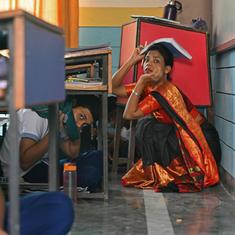Rajya Sabha: Venkaiah Naidu dismisses Opposition’s allegation about ‘hurried passage of bills’
The Upper House chairperson cited ‘empirical evidence’ to prove that a complaint by 15 legislators ‘does not stand scrutiny’.

Rajya Sabha Chairperson M Venkaiah Naidu on Monday rejected the allegation that the Opposition’s voice was being smothered in the House, and claimed empirical evidence proved that the accusation was wrong, PTI reported.
During Zero Hour, Naidu said that 15 Upper House members from 14 parties had addressed him a letter on July 25, conveying their “anguish and concern” over the passing of bills without scrutiny by either parliamentary standing or select committees. “This has cast a cloud over the functioning of our apex legislature, which is not good for our parliamentary democracy,” Naidu said, noting that the letter had been quoted in media reports.
The legislators mentioned statistics about the number of bills referred and not referred to scrutiny by parliamentary committees since the 14th Lok Sabha, which was in session from 2004 to 2009. “If their complaint is that bills first introduced in these Lok Sabha sessions were not referred to parliamentary committees for scrutiny, that is not certainly in my domain as the chairperson of Rajya Sabha,” Naidu said. “So, I am not in a position to respond to this complaint and I feel that this complaint, if any, has been addressed to the wrong person.”
The vice president said in the last five sessions chaired by him, 10 bills were first introduced by the government in the Rajya Sabha. “I am happy to inform you that as chairperson of this august House, I have referred eight of those 10 bills to respective department-related standing committees, though it is not mandatory to do so.”
Two draft laws that were not referred related to the inclusion of a few more groups in the Scheduled Tribes category and did not warrant a detailed scrutiny by a standing committee, Naidu said. The Motor Vehicles (Amendment) Bill received from the Lok Sabha was also referred to a select committee even though the proposed law had been scrutinised by a standing committee in the Lower House, he added.
“I hope that all of you would agree that such a record would not justify the allegation if it is so intended that Rajya Sabha is a party to hurried legislation.”
Some bills introduced first in the Upper House could not be referred to standing committees as they were yet to be constituted, the chairperson said. “...it is for the House to decide if a bill is to be referred to the select committee and not me as the chairperson of the House,” he added.
Also read
Rajya Sabha: Opposition MPs complain to Venkaiah Naidu about ‘hurried passage’ of bills
Addressing the legislators’ complaint about the House not following a long-standing convention of having one short-duration discussion each week, Naidu said that between 1952 and 2013, fewer than three such discussions were held every session. The chairperson said the legislators had incorrectly claimed that one such discussion was taken up every week during a session.
“During this session, two such discussions have already been taken up,” he added. “One more such discussion could have been taken up by now but the House was not allowed to transact any business for two and a half days.”
Naidu told the House that there was scope to take up more such discussions before the end of the Monsoon Session. “This shows that there is no violation of conventions in this regard,” he added. “This empirical evidence goes to prove that the complaint of smothering the voice of Opposition in Rajya Sabha also does not stand scrutiny.”
On Sunday, the Bharatiya Janata Party said it was surprising that the Opposition had objected to Parliament utilising more time to enact legislation. The saffron party pointed out that the Narendra Modi government sent 17 bills to parliamentary committees between 2014 and 2019, compared to just five during the second tenure of the United Progressive Alliance government. BJP General Secretary and Rajya Sabha MP Bhupender Yadav claimed the Opposition had a problem with the fact that Parliament had enhanced its productive hours and was performing “better than ever”.









